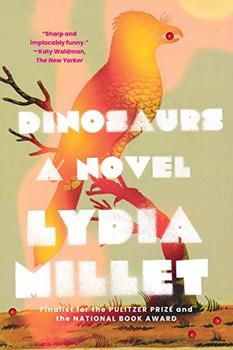Book Club Discussion Questions
In a book club? Subscribe to our Book Club Newsletter!
For supplemental discussion material see our Beyond the Book article, Novels About Trying to Do Good and our BookBrowse Review of Dinosaurs.
Please be aware that this discussion guide will contain spoilers!
-
Lydia Millet's Dinosaurs opens with a bird's-eye view of Arizona. What about this perspective on the world captivates Gil? How does the idea of looking at the world from above shape the course of this story? Are there other moments in the novel when something is depicted as though seen from above?
-
"There was something about Ardis. Momentum—you couldn't refuse her. It was easier not to" (p. 13). Does Gil think of his actions in terms of ease and difficulty? Are there other characters who think in these terms? When does Gil refuse someone? What is the significance of refusal for him?
-
Many different visions of freedom come up in Dinosaurs. We learn about Gil's youthful dream of giving away all his money, his grandmother's statement that "freedom can only be found in the mind" (p. 214), and Ted's idea of a selfish freedom based on impulses. What is the significance of freedom for Gil? For Ardis and Ted? For Sarah? For Tom? Does Dinosaurs arrive at a new understanding of freedom? How would you describe it?
-
What does Sarah mean when she tells Gil "You don't defend yourself" (p. 161). Do you agree with Sarah? Are there other characters in this book who don't defend themselves? Explain.
-
After discovering Ardis's infidelity, Gil asks "Why could no one be steadfast? Just stay?" (p. 182) What does Ardis represent to Gil in this moment? Who does he want to be steadfast? How do concerns about steadfastness and loyalty animate Gil's relationships in this book?
-
Gil describes his walk from New York City to Phoenix saying, "It's not much of a story. It was mostly big roads. Interstates, even. Because to go by the small roads would have taken a lot longer. It went like this: the same, the same, the same. Then for a few miles, slightly different. The same, the same, the same, the same ... then slightly different. I met some truckers. And saw a lot more roadkill than I ever wanted to" (p. 127). Is this an apt description for Dinosaurs itself? Why or why not? What does the walk mean to Gil? What does it symbolize for the story as a whole? Were there other events in the novel that reminded you of Gil's walk?
-
Do you agree with Sarah's decision to intervene on Gil's behalf and tell Dag to stop trying to communicate with him? Gil describes it as "a question of boundaries—they weren't clear. Hadn't been defined. It wasn't her fault. Still, she'd vaulted over one" (p. 162). What are other unspoken boundaries in the novel? How are they protected? How are they transgressed?
-
The slow cycling of weather and seasons in this novel contrasts with the linear development of Gil, Sarah, Ardis, Ted, Tom, Clem, and other characters. What is the significance of time for the plot of Dinosaurs? Did you relate to Gil's relationship with time?
-
Birds are ever-present symbols in this book. What does a bird symbolize to you? How did this novel influence your thoughts about birds? Describe the difference between Jason and Gil's relationship to birds in this story. What does this reveal about their personalities?
-
"At a certain point, not to engage is cowardly" Connie tells Gil early in the book, to which Gil replies "People default to cowardice. At least, I do" (p. 51). Do you agree with Gil's perception about himself and others? At what point in the story is Gil a coward? When is he not? How does this conflict between agency and default responses resonate throughout Dinosaurs?
-
When Gil confronts Gary about killing birds at night, Millet writes "He was afraid, he realized. But he didn't care. Rush forward. Blunder. A vector" (p. 223). Why is it important to know that Gil is afraid? How does fear influence Gil's life?
-
Although this novel is narrated in the third person, Gil's perspective is deeply imbedded in the writing. Why do you think Millet chose the third person? What would be different if the story were written from Gil's first-person perspective?
-
Were you surprised by the relationship between Gil and Sarah? What draws Sarah to Gil? Why is Gil reluctant to breach the boundary between friendships and romantic relationships?
-
Gil remembers learning that all the dinosaurs went extinct sixty-six million years ago and then, in school, discovering that some dinosaurs had survived and that birds are descended from them. How does this knowledge resonate in the plot of the novel? Why do you think this book is called Dinosaurs?
-
After reading Dag's email describing how he killed Gil's parents, Gil thinks "Mother. Mother. Mother. Pain" (p. 160). How did you read this line? What is Dag's role in this story?
-
Dinosaurs is an intimate story about a man overcoming trauma and simultaneously a broader story about community, relationships, and the world around us. How does Millet join these parts of her novel? What do these two levels bring out in each other?
-
At the end of the novel, surrounded by his friends in the glass house, Gil has the realization that "He was his own parent" (p. 229). What does this mean? What does Gil do for himself that a parent does for a child? How does this realization allow Gil to be part of the community of people around him?
Unless otherwise stated, this discussion guide is reprinted with the permission of W.W. Norton & Company.
Any page references refer to a USA edition of the book, usually the trade paperback version, and may vary in other editions.
